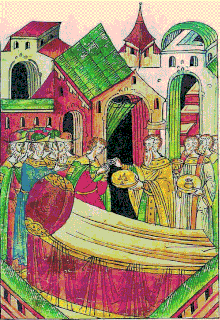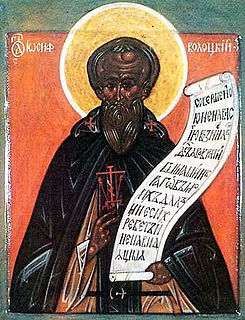 W
WAndrey Vasilyevich Bolshoy, nicknamed Goryai, was the third son of Vasili II of Russia who transformed his capital in Uglich into a major centre of political power and ensured the town's prosperity for two centuries to come. He was called Andrey Bolshoy to distinguish him from his younger brother Andrey Menshoy.
 W
WRichard Chancellor was an English explorer and navigator; the first to penetrate to the White Sea and establish relations with the Tsardom of Russia.
 W
WDmitriy Yurievich Krasny, was the youngest son of Yury of Zvenigorod and Anastasia of Smolensk, and grandson of Dmitry Donskoy. He was the appanage prince of Galich-Mersky and took part in the Great Feudal War. The strange circumstances of his death are described in chronicles with many details and cause speculation about possible poisoning.
 W
WDmitriy Yurievich Shemyaka was the second son of Yury of Zvenigorod by Anastasia of Smolensk and grandson of Dmitri Donskoi. His hereditary patrimony was the rich Northern town Galich-Mersky. Shemyaka was twice Grand Prince of Moscow.
 W
WElena Vasilyevna Glinskaya was a Russian regent. She was Grand Princess consort of Russia, as the second wife of Grand Prince Vasili III and de facto regent of Russia for five consecutive years, from 1533 until her death in 1538. She was the mother of Tsar Ivan the Terrible.
 W
WMichael Lvovich Glinsky was a noble from the Grand Duchy of Lithuania of distant Tatar extraction, who was also a tutor of his grand-nephew, Ivan the Terrible. Glinsky was born in Turov. He was son of prince Lev Borisovich Glinsky, and paternal uncle of Elena Glinskaya. As a young man, Glinsky served in the court of Emperor Maximilian I and earned distinction for his military service. Around 1498 he returned to Lithuania and quickly rose in power and wealth, angering local nobles. Just after commanding the victorious Battle of Kletsk against the Crimean Khanate in August 1506, he was accused of conspiracy against the deceased Grand Duke Alexander Jagiellon and lost all his wealth. Glinsky began an armed rebellion against Sigismund I, the new Grand Duke. The rebellion was unsuccessful and Glinsky retreated to the Grand Duchy of Moscow, where he served Vasili III of Russia. When the Muscovite–Lithuanian Wars renewed in 1512, Glinsky was instrumental in helping Moscow to capture Smolensk, a major trading center. However, he was not rewarded with the regency of the city. Angered, he planned to betray Vasili III, but the plot was discovered and he was imprisoned for 12 years. He was freed after his niece Elena Glinskaya, daughter of his brother Vasili Lvovich Glinsky and Ana Jakšić, married Vasili III in 1526. Before his death in 1533, Vasili appointed Elena as regent for his underage sons Ivan and Yuri. Elena disapproved of Glinsky's influence in the state affairs and had him sent to prison, where he soon died of starvation.
 W
WMaximus the Greek, also known as Maximos the Greek or Maksim Grek, was a Greek monk, publicist, writer, scholar, and translator active in Russia. He is also called Maximos the Hagiorite, as well as Maximus the Philosopher. His signature was Maximus Grecus Lakedaimon and his family origins were probably from Mystras, a location in Laconia, which was the geographical site of Ancient Sparta in the Peloponnese.
 W
WSiegmund (Sigismund) Freiherr von Herberstein was a Carniolan diplomat, writer, historian and member of the Holy Roman Empire Imperial Council. He was most noted for his extensive writing on the geography, history and customs of Russia, and contributed greatly to early Western European knowledge of that area.
 W
WLazar, also known as Lazar the Serb or Lazar the Hilandarian, was a Serbian Orthodox monk and horologist who invented and built the first known mechanical public clock in Russia in 1404. The clock, which also struck the hours, was built at the request of Grand Prince Vasily I of Moscow. Prior to his arrival in Moscow, Lazar had served as a monk in the Serbian Hilandar monastery at Mount Athos. The clock tower was located in the palace behind the Cathedral of the Annunciation. However, the clock and the church in which it was located have not survived.
 W
WPrince Daniil Vasiliyevich Shchenya was a Russian military leader during the reigns of Ivan III and Vasili III.
 W
WVladimir Andreyevich the Bold was the most famous prince of Serpukhov. His moniker alludes to his many military exploits committed in the wars waged by his cousin, Dmitri Donskoi of Moscow.
 W
WJoseph Volotsky — also known as Joseph of Volotsk or Joseph of Volokolamsk ; secular name Ivan Sanin — was a prominent Russian theologian and early proponent of tsarist autocracy, who led the party defending monastic landownership. The Russian Orthodox Church considers him a saint ; his memory is celebrated on 9 September and 18 October.